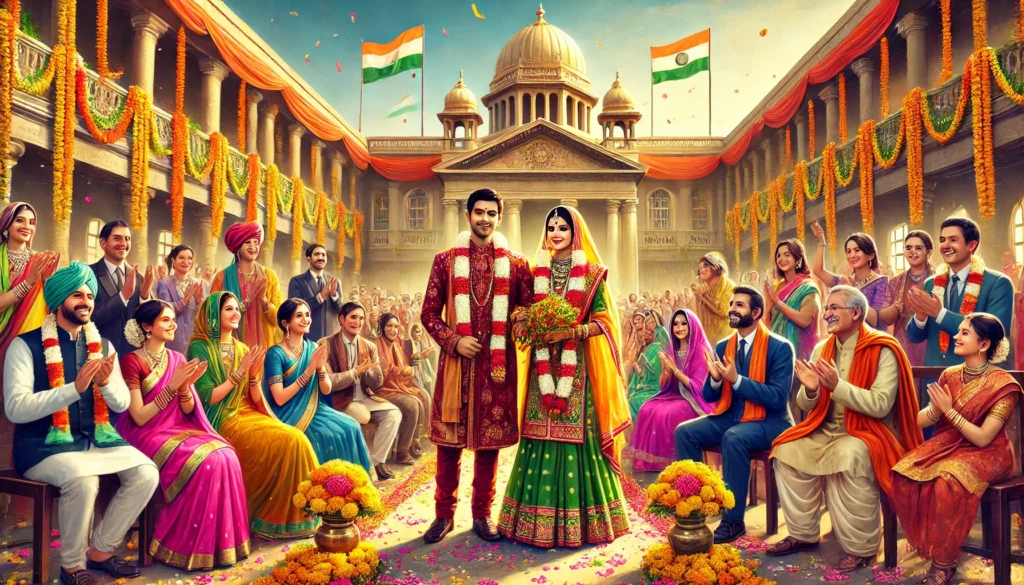Inter-Caste Court Marriage In Patna

What is Inter Caste Marriage?
In recent years, the idea of inter-caste court marriages has gained significant momentum across India, including in Patna. As one of the major cities in Bihar, Patna stands at the crossroads of tradition and modernity, where societal norms are challenged by the evolving aspirations of its younger generation.
This article explores the concept, procedures, legal framework, and the social implications of inter-caste court marriage in Patna, shedding light on how love continues to transcend barriers in the city.
Article 15
- Prohibits discrimination on the grounds of religion, race, caste, sex, or place of birth, ensuring that individuals are free to marry outside their caste without facing discrimination.
Article 21
- Guarantees the right to life and personal liberty, which includes the right to choose one’s life partner, regardless of caste.
Article 17
- Abolishes untouchability, reinforcing the idea of social equality and protection for inter-caste couples.
Understanding Inter-Caste Court Marriage
Inter-caste marriages involve a union between two individuals belonging to different castes. While such alliances have been historically frowned upon in various parts of India, they symbolise progressive change in societal dynamics. Court marriages provide a legal and secular avenue for couples to solemnise their union without being subject to traditional or religious constraints.
In Patna, the process of inter-caste court marriage follows the provisions of the Special Marriage Act, 1954. This legislation ensures equality and protection for couples irrespective of caste, creed, or religion, embodying the constitutional right to freedom of choice in marriage.
Why Inter Caste Marriages Matter
Promoting Equality
Inter caste marriages challenge the age-old caste system, promoting the constitutional values of equality and dignity. They reduce caste-based discrimination, fostering social harmony.
2. Upholding Constitutional Rights
- Article 15: Prohibits discrimination based on caste.
- Article 21: Protects the right to life and personal liberty, including the freedom to choose one’s partner.
- Article 17: Abolishes untouchability, which often stems from caste discrimination.

3. Legal Safeguards
The judiciary and the government encourage inter caste marriages through initiatives like financial incentives and legal protections, helping couples navigate societal pressures.
Legal Provisions Supporting Inter Caste Marriage
Special Marriage Act, 1954: Provides a legal framework for inter caste and interfaith marriages without requiring religious conversions.
Protection of Civil Rights Act, 1955: Penalizes discrimination based on caste, ensuring the safety of inter caste couples.
Indian Penal Code (IPC): Sections like 506 (criminal intimidation) and 34 (common intention) address threats faced by inter caste couples.
The Legal Framework for Inter-Caste Court Marriage in Patna
To understand the process of inter-caste court marriage in Patna, one must familiarise themselves with the legal steps:
- Notice of Intended Marriage: Couples are required to submit a written notice to the Marriage Registrar in Patna, specifying their intention to marry. This notice must be given at least 30 days before the marriage date.
- Verification Period: During the 30-day notice period, the registrar displays the notice publicly to invite objections, if any. If no objections are raised, the marriage can proceed.
- Document Submission: The couple must provide the following documents:
- Proof of age (birth certificate, passport, or Aadhaar card)
- Residential proof (ration card, voter ID, or utility bills)
- Passport-sized photographs
- Affidavits declaring the marital status and consent of both parties
- Marriage Solemnization: On the scheduled date, the couple, along with three witnesses, must appear before the registrar to sign the marriage certificate. The marriage is then legally recognized.

Landmark Judgments on Inter Caste Marriage
Over the years, several landmark judgments have shaped the landscape of divorce laws in India, clarifying legal principles and ensuring justice in family law matters. These judgments not only interpret existing laws but also provide guidance for future cases. Here are some of the most important landmark judgments related to divorce in India:
Shah Bano Case (1985) – Maintenance Rights of Muslim Women
Shah Bano Case (1985) Although not directly related to inter-caste marriage, this case had a significant impact on personal laws in India. The Supreme Court ruled in favor of Shah Bano, a Muslim woman, for maintenance after divorce, which emphasized the need for gender equality. The case also sparked a national conversation about the rights of individuals in marriages, including inter-caste unions, within the framework of personal laws.
Lata Singh Case (2006) One of the landmark judgments in favor of inter-caste marriage was delivered by the Supreme Court in Lata Singh v. State of Uttar Pradesh. The case highlighted the issues faced by inter-caste couples and emphasized the importance of personal liberty. The Court ruled that adults have the right to choose their marriage partners, irrespective of caste, and any kind of harassment or harm to inter-caste couples would not be tolerated. The judgment was a strong endorsement of individual freedom and equality in marriage choices.
Kajal v. State of Haryana (2020) The Kajal v. State of Haryana case reaffirmed the protection of inter-caste couples. The Supreme Court directed state authorities to protect inter-caste couples from honor killings and violence, recognizing the legal and moral rights of individuals to marry outside their caste. This judgment also emphasized that the police should provide protection to couples who face threats to their lives due to caste-based discrimination.
Services Provide By Us
Alimony and Maintenance in Patna
Contact best divorce lawyer Patna
Court Marriage in Patna
Divorce Advocate in Patna
Divorce Under Muslim Personal Law
Dowry and Domestic Violence
Inter Religion Marriage in Patna
Inter-Caste Court Marriage In Patna
Connect With Our Social media
Advocate Tabish Anmad
https://www.linkedin.com/in/advocate-tabish-ahmad-667015326
Our Legal Networks
Best Tax Law Firms in Bihar
List of all Honoble High Courts
Search Your Case
About Us
Our Presence On Social Media
What is the process for inter-caste court marriage in Patna?
The process involves filing an application under the Special Marriage Act, 1954, submitting required documents (age proof, address proof, photos, etc.), giving a 30-day notice for objections, and completing the marriage registration with the presence of witnesses.
What documents are required for inter-caste court marriage in Patna?
Age proof (birth certificate, passport, or 10th mark sheet)
Address proof (Aadhaar, voter ID, or utility bill)
Passport-sized photographs of both parties
Affidavit declaring marital status and intention
Witness ID proofs (for three witnesses).
Is parental consent required for inter-caste court marriage in Patna?
No, parental consent is not mandatory for inter-caste marriages under the Special Marriage Act. However, both parties must be of legal marriageable age (21 for males and 18 for females).
What is the role of the 30-day notice period in inter-caste court marriage?
The 30-day notice period allows the marriage officer to display a notice in their office for public objections. If no objections are raised, the marriage can proceed.
Are there any fees for court marriage in Patna?
Yes, there is a nominal fee for court marriage registration, which may vary slightly depending on the jurisdiction. Additional charges may apply for affidavits, stamps, and other paperwork.
Can an inter-caste marriage be registered in Patna without a marriage ceremony?
Yes, the Special Marriage Act allows registration without a religious or traditional ceremony. A declaration signed in front of the Marriage Registrar and witnesses is sufficient.
What should I do if someone objects to my inter-caste marriage?
If objections are raised during the 30-day notice period, the Marriage Registrar will verify their validity. If the objections are found invalid, the marriage can proceed.
How long does it take to complete the inter-caste court marriage process in Patna?
The entire process, including the 30-day notice period, document verification, and registration, typically takes 30–45 days.
Are there any legal benefits for inter-caste marriages in India?
Yes, the Indian government offers incentives, such as financial assistance, to promote inter-caste marriages under various schemes. Check with local authorities for details.
Can non-residents of Patna apply for inter-caste court marriage in the city?
At least one party must have resided in Patna for at least 30 days before submitting the marriage notice. Proof of residency is required.

